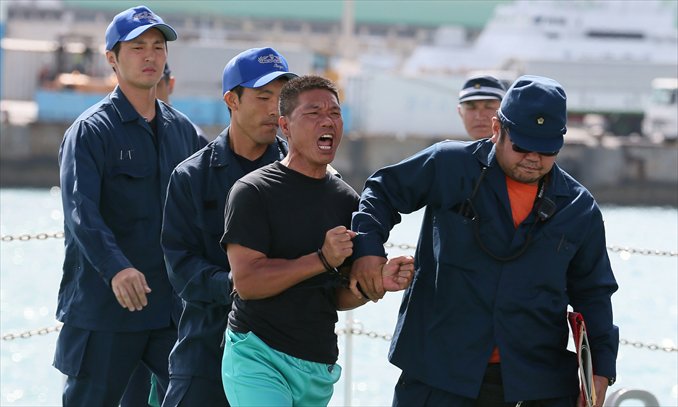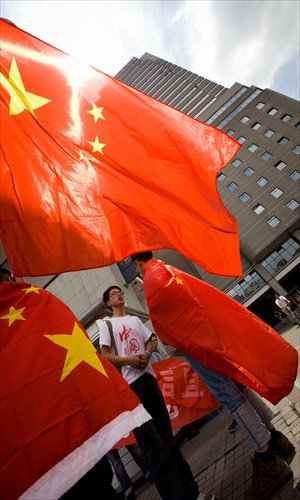Japan to 'deport' activists

Bilateral relations between China and Japan were dealt their biggest blow since 2005 as anti-Japan protests were staged in several cities on Thursday and the Chinese government called for the immediate and unconditional release of its nationals detained by Japan after landing on the Diaoyu Islands.
Vice Foreign Minister Zhang Zhijun called his counterpart in Japan Thursday protesting against the illegal detention of 14 Chinese who sailed to the Diaoyu Islands the previous day to assert sovereignty. Seven of them successfully made it to one of the islands, carrying Chinese flags.
A group of Chinese diplomats in Japan have arrived in Okinawa to visit the detainees and negotiate with the Japanese side, according to the Chinese foreign ministry. Representatives from Hong Kong also joined, as many of the activists arrested were from the special administrative region.
Japan will not prosecute the 14 people, and will transfer them to the immigration bureau as early as Friday, which will "deport" them, Kyodo News quoted government sources as saying on Thursday, adding that the move was "a bid to ratchet down tensions between Tokyo and Beijing."
The Japan Coast Guard said that although the detainees threw bricks at patrol vessels while being intercepted during landing, there were no injuries or damage done to the vessels, so the police will not press criminal charges against them, Kyodo News reported.
Meanwhile, protests broke out in several cities in China on Thursday including Beijing, Shanghai, Guangzhou and Shenyang in front of the Japanese embassy and consulates demanding the release of the detainees and compensation for the damage to their vessels, according to the activist group.
"We have two groups, each with around 50 people, who protested in Beijing. So far, Guangzhou has seen the biggest protest which saw not only our members taking part but also other citizens," Chen Fuhua, a director of the World Chinese Alliance in Defense of the Diaoyu Islands, told the Global Times.
Anti-Japanese sentiment was widespread in the media and among Web users in China, with official media outlets such as Xinhua and the People's Daily voicing support for the Chinese activists and strongly protesting against the Japanese government.
Some Web users even called for military action to resolve the Diaoyu Island issue.
"The escalating dispute that caused the detention of our Chinese activists has provoked antagonism between the public in both countries, and the constant conflicts between the two nations have left Chinese disappointed, even causing them to lose their hopes for prospects of a friendly relationship in the future," Gao Hong, a Japanese specialist at the Chinese Academy of Social Sciences, told the Global Times.
The Japanese embassy in Beijing released a notice on its website in Japanese warning its nationals to stay away from protesters and to behave themselves when communicating with Chinese people, as a precaution for their own safety.
Liu Jiangyong, a professor on Sino-Japanese relations at Tsinghua University, warned that the tension caused by the Diaoyu dispute may be used by the right wing in Japan to instigate nationalist sentiment and stir up an anti-China wave all across Japan.
Forty years after China and Japan signed a communiqué to normalize ties, the bilateral relationship remains volatile.
Large-scale protests broke out nationwide in China in 2005, triggered by Japan's alteration of history textbooks which China claimed denied its invasion during World War II.
"Provoked by the Chinese activists' moves to assert China's sovereignty over the Diaoyu Islands, a majority of Japanese nationals have uttered extreme voices to instigate antagonism against China and Chinese people, which is irrational," Teruo Kuno, a director of the Japan-China Friendship Association in Nagoya, told the Global Times.
Kuno warned that most Japanese, who have little understanding of the history of the Diaoyu Islands, can be easily instigated by right wing groups, and the friendship between China and Japan should not be affected by the dispute.
Shen Danyang, spokesman of the Ministry of Commerce, said Thursday that China was greatly concerned about the issue of the illegal detention of the Chinese nationals, urging Japan to properly handle the situation, the Xinhua News Agency reported.
A parliament member with Japan's Liberal Democratic Party told Kyodo News Thursday that the party is planning to pass resolutions at the legislature to protest the Diaoyu landing by Chinese activists and South Korean President Lee Myung-bak's recent visit to the Dokdo islands and his demand for an apology for past brutality from Japanese emperor.

Related report:
Nation's strength backs Diaoyu progress
The tension surrounding the Diaoyu Islands is focused on whether the detained Chinese activists will be released by Japanese authorities Friday.